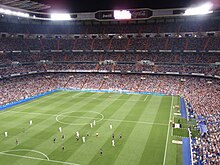Rosenborg BK
Yet their performance was improving and in 1931 the team qualified for the highest level, and one year later they played in the Norwegian Cup for the first time.
It was also at this time that Rosenborg started planning for a new home ground at Lerkendal, although this project was not completed until after World War II.
Rosenborg finished as number 9 out of the 16 teams and was relegated to the new 2nd division where they played from 1963 until they won promotion by winning group B in 1966.
Led on by such players as Harald Sunde, Nils Arne Eggen, and the talented young forward Odd Iversen, Rosenborg won their first league title.
However, when both Odd Iversen and Harald Sunde left the club, Rosenborg virtually stopped scoring goals and failed to win again in 1970.
Curtis was criticized for being too defensively minded and was replaced by recently retired player Nils Arne Eggen, who reverted to a more crowd-pleasing style of play.
A flurry of coaches (including Eggen) came and went without making an impact and in 1977 the team won only one match the entire season, finishing dead last.
Nils Arne Eggen was then called in for his third tenure, from 1978 to 1982, and with the return of the now 35-year-old Odd Iversen, Rosenborg climbed back into the 1st Division the following year.
In strong contrast to the Norwegian national team's defensive and often criticized (yet highly effective) style of play at the time, Rosenborg achieved success through strict adherence to crowd-pleasing, attacking football.
In 1995, Rosenborg qualified for the UEFA Champions League for the first time, a feat which helped secure the club's finances and further cement its dominance at the domestic level.
Always able to offer the most promising new players better terms than their opponents, as well as the prospect of playing in Europe, Rosenborg were assured of future league championships and European qualifications.
In the 1996–97 season, they were heading for an early exit, but with Milan squandering valuable points, the stage was set for a deciding match at San Siro.
At the end of 2002 Rosenborg saw the retirement of Nils Arne Eggen after many successful years, during which he was only relieved once, in the 1998 season, by his assistant, Trond Sollied.
Under new leadership, Rosenborg laid waste to the league, losing only three games and winning 14 points ahead of runners-up Bodø/Glimt.
It also became clear that with the increased flow of capital into Norwegian football, some clubs were finally beginning to perform at a more consistent level close, or even equal, to that of Rosenborg.
Ola By Rise's contract was terminated in October, even though he succeeded in leading the team to the Champions League, and for some time it was uncertain who would take over.
On 22 October, in what was described as "the biggest clash since the Battle of Stiklestad", Rosenborg defeated Brann away, giving the club a six-point lead with two rounds to go.
On 31 October, Per-Mathias Høgmo ended prolonged speculation on whether he would return and in what role, when he held a press conference where he stated that he resigned as manager with immediate effect, and would withdraw from football altogether.
After Tørum's resignation, Rosenborg started negotiating with Trond Sollied to fill the head coach vacancy.
After a lengthy process Sollied turned down the job, giving ammunition to those criticizing the way in which Rosenborg has dealt with their recurring head coach issue in the latter years.
On 14 December 2012, Per Joar Hansen was confirmed as new head coach, with the ambition to take Rosenborg back to the top of the league.
[11] Hansen's first major modification was changing from Rosenborg's regular 4–4–2 to the more aggressive 4–3–3 as they played in the 90's, taking the team back to the roots.
[13] However, the beginning of the second half of the season shocked everyone when Rosenborg were surprisingly beaten by St Johnstone in the Europa League second qualifying round.
Rosenborg continued to gather points in the league, but were shocked when they lost to relegation threatened Tromsø in the 23rd round.
[16] In June 2014, after a disappointing spring season with elimination from the Cup in the third round against Ranheim, lack of stable performance in the league and an embarrassing defeat against Sligo Rovers in the Europa League, it was decided to fire head coach Per Joar Hansen and assistant coach Bård Wiggen.
During the previous two season, Rosenborg had a tendency to collective collapse in the last ten minutes of matches due to exhaustion.
As a result of Rosenborg's crowd pleasing play, the home spectator numbers increased by 31 percent from 13,922 to 18,239 on average.
At the end of the season Rosenborg won their 23rd title, finishing 12 points clear ahead of the second place Strømsgodset.
[22] It has four three-tier grandstands without corners with a capacity for 21,421 spectators, of which 1,338 are in club seating and luxury boxes on the center tier of all four stands.
[23] The stadium is part of Lerkendal idrettspark, which also consists of three training pitches, two full size and one which has artificial turf.


